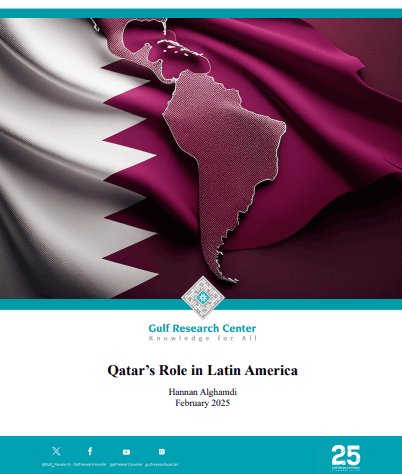
Qatar has established itself as an important diplomatic player, mediating key conflicts such as negotiations between Israel and Hamas, facilitating talks between the Taliban and the U.S. in Afghanistan, and playing a role in diplomatic efforts between Turkey and Syria. However, beyond the Greater Middle East, Doha has also extended its diplomatic outreach, for example, by deepening its economic and political engagement in Latin America. This expansion aligns with Qatar’s broader foreign policy of balancing strategic neutrality with active global mediation. As Qatar has steadily expanded its global footprint over the past two decades, its engagement with Latin America has grown significantly in recent years.
Diplomatic Mediation and Political Engagement
One of Qatar’s most notable diplomatic achievements in Latin America was its role in facilitating discussions between the United States and Venezuela, leading to the landmark Barbados Agreement in October 2023. This agreement, aimed at ensuring a competitive presidential election in Venezuela in 2024, prompted Washington to ease sanctions on Venezuela’s oil sector, providing a crucial economic lifeline to the country. The agreement was reportedly the product of extensive behind-the-scenes diplomacy in Doha, where U.S. and Venezuelan officials held multiple rounds of talks. Qatar played a role in securing Maduro’s commitment to the electoral process through a previously undisclosed Memorandum of Understanding (MoU) signed with Venezuela on September 29, 2023. This agreement laid the groundwork for Maduro's eventual agreement to the Barbados deal. Qatar thus ensured that Venezuela committed to key electoral provisions, strengthening its reputation as an effective mediator.
Qatar's diplomatic efforts have not stopped there. The country has been increasingly involved in the long-standing border dispute between Venezuela and Guyana over the oil-rich Essequibo region. With the Venezuelan government conducting a referendum in December 2023, in which 95% of voters supported annexing Essequibo, tensions escalated sharply. Doha, leveraging its reputation as a neutral mediator, has engaged both nations at the highest levels. According to Qatar’s Minister of State for Foreign Affairs, Sultan bin Saad Al-Muraikhi, “Qatar believes that sustained dialogue and mutual understanding are the best pathways to resolving disputes, and we stand ready to facilitate any diplomatic process between Venezuela and Guyana”. The Qatari approach seeks to prevent regional destabilization while maintaining its close economic and political ties with both nations.
Qatar's diplomatic efforts have not stopped there. The country has been increasingly involved in the long-standing border dispute between Venezuela and Guyana over the oil-rich Essequibo region. Following Venezuela’s December 2023 referendum supporting annexation, tensions spiked. Qatar, leveraging its neutrality, engaged both sides, with Minister Sultan bin Saad AlMuraikhi affirming Doha’s commitment to mediation. “Qatar believes that sustained dialogue and mutual understanding are the best pathways to resolving disputes, and we stand ready to facilitate any diplomatic process between Venezuela and Guyana”. However, a late-December British warship visit to Guyana prompted Venezuelan military drills, straining a fragile truce. In early 2024, Venezuela’s legislature declared a new “Guayana Esequiba” state, defying the ICJ. While tensions briefly eased during Venezuela’s elections, Caracas reignited the crisis in 2025 by holding local elections in Essequibo, prompting Guyana to seek ICJ intervention after a border clash injured six soldiers and a Venezuelan patrol ship entered its waters. Amid renewed tensions, Qatar continues advocating for dialogue to prevent regional destabilization while maintaining close ties with both nations. With growing economic interests in Latin America, including energy and trade partnerships, Doha sees stability in the region as crucial to its broader diplomatic and economic strategy.
Qatar has been actively engaged in sports diplomacy with Latin America, using football as a bridge to strengthen its diplomatic engagement in the region. In 2018, as part of its preparations for the 2022 FIFA World Cup, Qatar sponsored CONMEBOL competitions, including the Copa Libertadores, Copa Sudamericana, and Recopa, reinforcing its presence in Latin American football. Despite the backlash it faced at the time, Qatar has continued to expand its football diplomacy efforts. In June 2024, Qatar’s Aspire Academy launched a major football development workshop in La Plata, Argentina, in partnership with Estudiantes de La Plata. Additionally, Qatar has expressed interest in further strengthening its football ties with Latin American federations, exploring new sponsorship deals and exchange programs to deepen its long-term influence in the region.
Overall, Qatar’s political engagement in Latin America is characterized by a pragmatic and nonconfrontational approach. Unlike some other Gulf states, Qatar has avoided taking sides in regional disputes, instead positioning itself as a neutral mediator. This strategy has allowed Qatar to build relationships with a diverse range of countries, from left-leaning governments in Bolivia and Venezuela to more conservative administrations in Brazil and Colombia.
Economic Diplomacy and Trade Expansion
One of the cornerstones of Qatar’s foreign policy in Latin America is economic diplomacy. Through its sovereign wealth fund, the Qatar Investment Authority (QIA), Qatar has made significant investments in the region. Qatar’s interest in Latin America is relatively recent, emerging in the early 2000s as part of its broader strategy to diversify its international partnerships and reduce its reliance on traditional allies. The region’s vast natural resources, growing economies, and geopolitical significance have made it an attractive partner.
Particular emphasis is given to the energy sector. QatarEnergy has shown a keen interest in Venezuela's substantial oil reserves, the largest confirmed globally. In 2023, Qatar played a role in mediating discussions between the United States and Venezuela, leading to a temporary easing of U.S. sanctions on Venezuelan oil exports. This diplomatic achievement opened new avenues for collaboration between Doha and Caracas. However, in April 2024, the U.S. reinstated certain sanctions due to concerns over Venezuela's adherence to electoral commitments. Despite these challenges, Venezuela has actively invited Qatari investments in its oil, gas, and mining sectors, with officials emphasizing the availability of numerous promising opportunities. Qatar has also expanded trade relations with Guyana, which is rapidly becoming one of the world’s fastestgrowing oil producers. In late 2024, Qatar and Guyana signed a Memorandum of Understanding (MoU) to hold regular political consultations, paving the way for closer economic collaboration. Guyanese President Mohamed Irfaan Ali emphasized that "Qatar is an important partner in our vision for sustainable development and energy cooperation".
Trade volume between Qatar and Latin American countries has grown significantly as a result. According to Qatar Chamber First Vice-Chairman HE Mohamed bin Twar Al Kuwari, trade volume between Qatar and Latin America reached QR 3.6 billion in 2023, highlighting the region’s increasing economic importance to Doha. Qatar has made substantial investments in energy, agriculture, and infrastructure across Latin America, strengthening its economic footprint. In Brazil, Qatar’s presence is marked by $5 billion in investments across finance, mining, and agriculture, with QatarEnergy securing a 20% stake in the Agua Marinha offshore oil block in 2022 alongside TotalEnergies and Petronas. To enhance food security, QIA holds a 12% stake in Adecoagro, a major agribusiness firm operating in Brazil, Argentina, and Uruguay, and owns 40% of a joint venture with BRF, Brazil’s leading meat processor. In Mexico, QatarEnergy has invested in offshore oil fields, acquiring stakes in multiple exploration blocks in the Campeche Basin, while Qatari firms are also involved in Mexico’s luxury tourism sector. In Argentina, Qatar invested in the Vaca Muerta shale formation, one of the world's largest shale reserves, and has backed the country’s agricultural and infrastructure projects, including through a $1 billion Gulf investment pledge in 2022. Beyond these key nations, Qatar has engaged in tourism infrastructure in Cuba and aviation partnerships in Chile, reinforcing its growing economic presence in Latin America.
The 2017 Gulf crisis, which led to a blockade by neighboring countries, prompted Qatar to rethink its food security strategy, reducing its reliance on regional suppliers and diversifying imports. This shift led to increased agricultural imports from Brazil and Argentina, reinforcing Doha’s strategy of securing essential commodities like beef and grains. Qatar’s investment in Brazilian agribusiness and livestock production, including its stake in Adecoagro and BRF’s halal meat venture, has played a crucial role in this diversification. Beyond agriculture, Qatar has expanded its infrastructure presence in El Salvador, supporting construction projects that further deepen its economic presence in Latin America. Moreover, Qatar has used its diplomatic power to support multilateral initiatives in the region, including disaster relief efforts for countries affected by earthquakes, hurricanes, and other crises. These humanitarian contributions have also reinforced Qatar’s image as a reliable partner and strengthened its political and economic relations with Latin American countries.
Diplomatic Challenges and Future Prospects
While Qatar’s growing influence in Latin America presents opportunities, it also comes with diplomatic challenges. The Essequibo dispute remains particularly complex, with Venezuela escalating its annexation claims despite strong opposition from Guyana and the international community. Venezuela’s refusal to recognize the ICJ ruling has further complicated peace efforts. Tensions spiked again in early 2025 when Caracas held local elections in Essequibo, defying the ICJ’s authority and prompting Guyana to seek further intervention. Border clashes and naval incursions have worsened instability, raising concerns of a broader crisis. Given its diplomatic track record, Qatar has the opportunity to solidify its role as a key mediator, leveraging its economic interests in the region and credibility in Venezuelan negotiations to bridge divides and promote stability, preventing further regional destabilization.
Furthermore, U.S. geopolitical interests in the region remain a factor. While Washington has cautiously engaged with Caracas following the Barbados Agreement, it continues to back Guyana’s territorial integrity and energy development projects. In January 2025, Secretary of State Marco Rubio reaffirmed this commitment during discussions with Guyanese President Dr. Irfaan Ali, emphasizing U.S. backing amid ongoing border disputes with Venezuela. Additionally, the Export-Import Bank of the United States approved over $526 million in financing for Guyanese energy projects, underscoring the strategic importance of Guyana in U.S. regional policy.
Under the presidency of Donald Trump, U.S. policy in Latin America has become more protectionist, with heightened inspection on foreign investments in key industries. This shift presents both opportunities and risks for Qatar. On one hand, stricter U.S. policies could push Latin American nations to diversify their international partnerships, creating openings for Qatari investment. On the other hand, increased geopolitical tensions could, as it has before, complicate Doha’s diplomatic efforts in the region.
*Hannan Alghamdi is a researcher at the Gulf Research Center (GRC)

